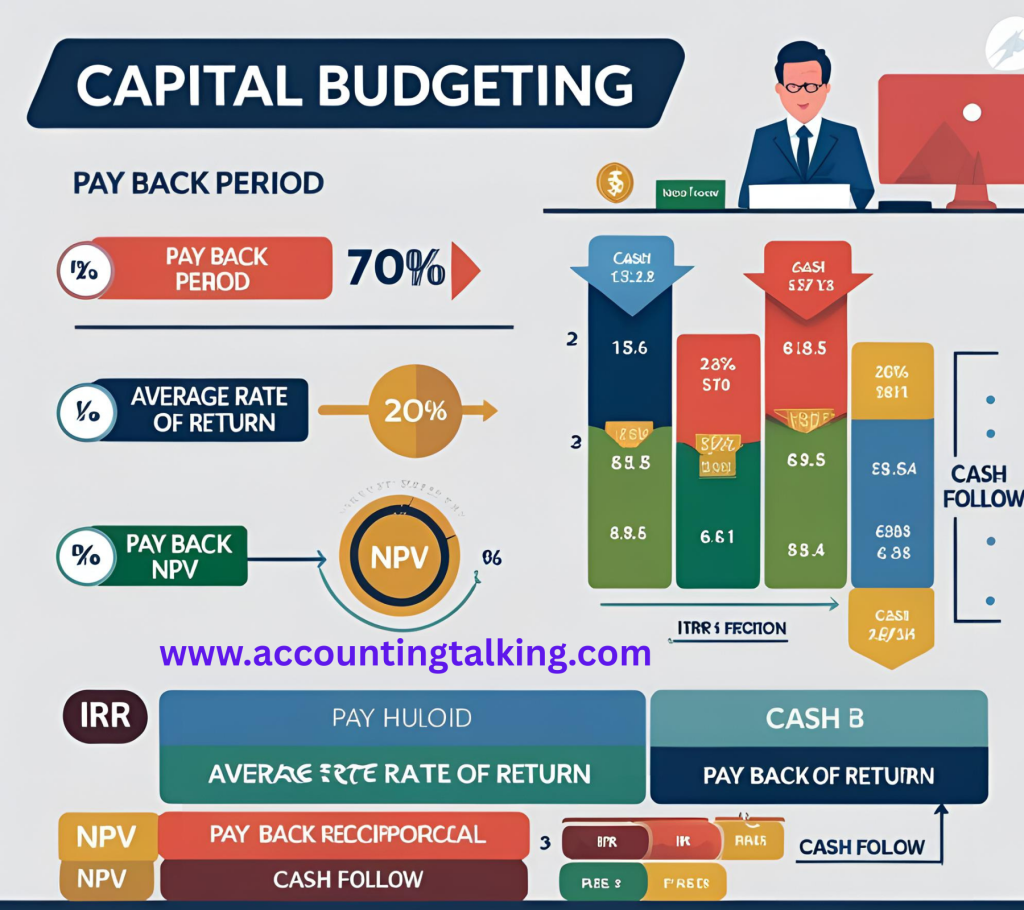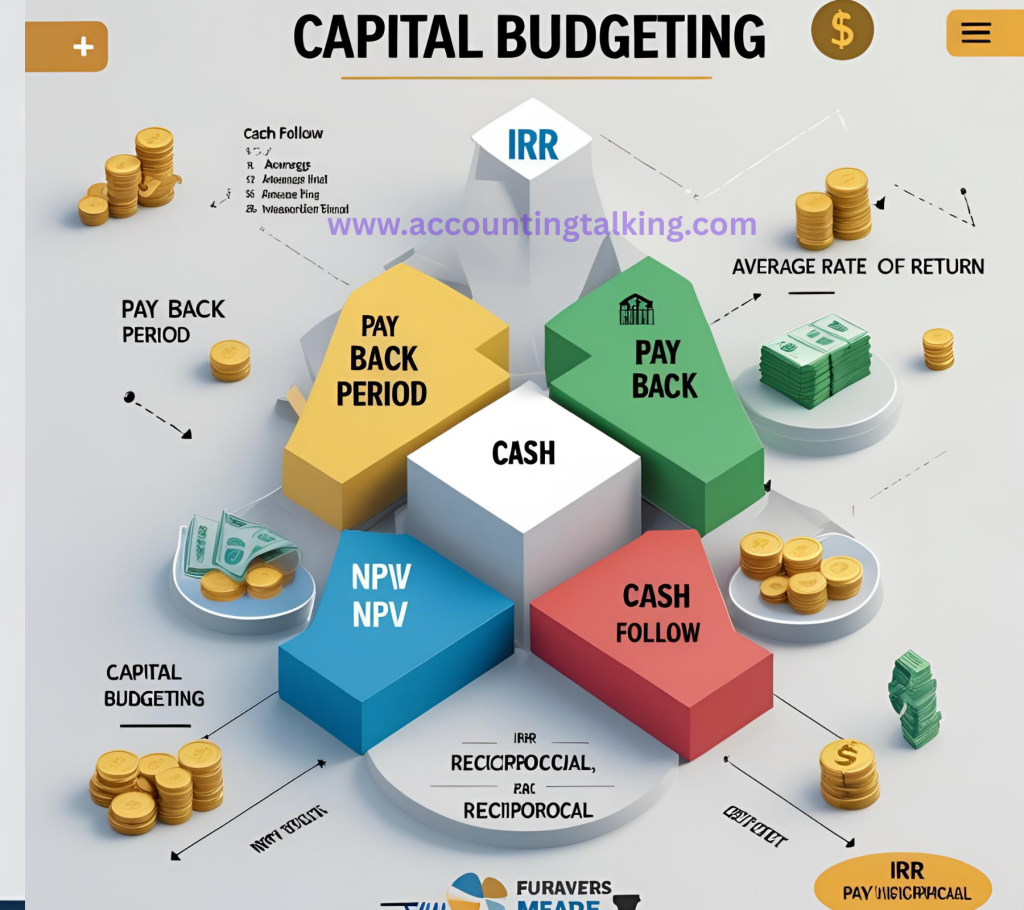
What is Capital Budgeting:
Capital budgeting is the process of evaluating and selecting long-term investments to make the most effective monetary decisions regarding the deployment of these funds. Such projects are generally financed through out-of-pocket expenditures and anticipated positive future cash flows and lasting effects.
Importance of Capital Budgeting:
Making the right capital budgeting decisions is critical for any business, small or large, for-profit or nonprofit. It’s not just an accounting exercise but a strategic financial operation determining a company’s future. Here’s why it’s so crucial:
Long-Run Effects on Revenue and Growth:
Foundation for Success: The capital budgeting decision involves a substantial investment that will invariably affect the company for years or even decades. Those decisions shape productive capacity, market dominance , and long-term capacity to make money and earn profit.
Strategic fit ensures that major investments are coherent with the firm’s overall strategy, whether it is market expansion, product innovation, or cost leadership. Lack of sound capital budgeting: The company can allocate resources to projects that will not support its main vision without good project capital budgeting.

This would involve a substantial financial commitment:
Irreversible Decisions: Capital decisions often require a huge amount of capital at stake, and the size makes such decisions irreversible (or at least very expensive to reverse). A poor capital budgeting decision can lead to large sums of scarce resources being locked into unprofitable projects that may not be realisable.
Opportunity Cost: All investment decisions have an opportunity cost, which is the value of the next best alternative that was not chosen. Capital budgeting aims to ensure that the project that has been selected provides the best possible return on capital invested, from among any proposed projects that could be done, given the availability of incoming funds.
Risk Management:
Forecasting / Evaluation: The practice of capital budgeting compels organisations to forecast future cash flows in detail, anticipate potential threats to the project (market volatility, technological extinction, and legislative change, for instance), and evaluate the risk.
Management of Risks: Once these risks are identified, management can make plans early to minimise the effects of threats/risks on the company and, as a result, increase chances of project success and save it from substantial financial losses.

Effective use of limited resources:
Finite Capital: No business has infinite funds. Capital budgeting is a systematic approach to prioritising and choosing the most profitable and strategic projects when there is more demand for capital than is available.
Optimising Returns allows scarce human, financial , and technological resources to be channelled into the projects with the highest guaranteed returns and not wasted on things that cannot possibly be fully utilised.
Enhances Shareholder Wealth:
Value Creation: The financial goal of most firms is to maximise shareholder value. Useful capital budgeting results in long-term value creation that is greater than investment costs, promoting profitability, share value, and dividends.
Responsible Ownership: It forces the discipline in terms of investment decisions: It forces to examine the big decisions closely and justify them carefully so that better investment choices (for the company owners) tend to get made.
Accountability and Performance Measurement:
No Ambiguity: Investment in budgeting makes it clear what the financial expectations and how the projects are going to be evaluated. This is a standard against which the actual performance of a project can be measured.
Post-Audit and Learning — Comparing actual results with what was expected can provide valuable insights for businesses to refine their forecasting approach and make better investment decisions in the future.
Conculation:
It is, in a way, the financial north star that points a business toward sustainable growth and success. It turns raw investment ideas into scrupulously vetted projects, it guarantees that a company’s hard-won capital is wisely invested in order to create the greatest long-term value that it can.
Previous Post:
অর্থনীতি ও বানিজ্যিক ভূগোল এর ফাইনাল সাজেশন||PDF
অর্থনীতি ও বানিজ্যিক ভূগোল ফাইনাল সাজেশন: পরীক্ষার আগে শেষ মুহূর্তের প্রস্তুতি সব শিক্ষার্থীর জন্যই অত্যন্ত গুরুত্বপূর্ণ। আমরা জানি, বিশাল সিলেবাসের
এমপিও শিক্ষকদের স্বয়ংক্রিয় বদলী সফটওয়্যার চালু। নীতিমালা ও শর্তাবলী -২০২৫।
এমপিও শিক্ষকদের বদলী নীতিমালা-২০২৫ এমপিওভুক্ত কারিগরি শিক্ষকদের সফটওয়্যারের মাধ্যমে বদলি নীতিমালা প্রকাশ করা হয়েছে। এতে প্রতি প্রতিষ্ঠান থেকে দুইজন শিক্ষকের
What is Capital Budgeting || Importance of Capital Budgeting.
What is Capital Budgeting: Capital budgeting is the process of evaluating and selecting long-term investments to make the most effective monetary
What is Financial Management? Function of Financial Management.
What is Financial Management? In business, cash is king. How a corporation or business arranges, obtains, spends, and protects its money
What is relevant cost analysis ? প্রাসঙ্গিক ব্যয় বিশ্লেষণ কি ?
ব্যবস্থাপনা হিসাববিজ্ঞানের একটি গুরুত্বপূর্ণ শাখা হলো প্রাসঙ্গিক ব্যয় বিশ্লেষণ (Relevant Cost Analysis)। এটি এমন একটি প্রক্রিয়া যার মাধ্যমে ভবিষ্যৎ কার্যক্রমে
What is accounts receivable | প্রাপ্য হিসাব কি? বিস্তারিত।
প্রাপ্য হিসাব বলতে কি বুঝ? প্রাপ্য হিসাব (Accounts Receivable) হলো সেই অর্থ যা কোনো ব্যবসা প্রতিষ্ঠান তার গ্রাহকদের কাছে পণ্য
